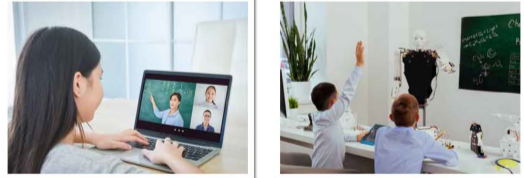Tuyển Cộng tác viên Hoc24 nhiệm kì 26 tại đây: https://forms.gle/dK3zGK3LHFrgvTkJ6
Lesson 1
Các câu hỏi tương tự
d. Read the words with the correct stress to a partner. (Đọc các từ với trọng âm chính xác cho bạn cùng bàn của em.)
c. Listen and cross out the word with the wrong word stress. (Nghe và gạch bỏ từ có trọng âm của từ sai.)
interaction (sự tương tác) presentation (sự trình bày)
conversation (hội thoại) education (sự giáo dục)
b. Listen to the words and focus on the underlined letters. (Nghe các từ và tập trung vào các chữ cái được gạch chân.)
prediction (sự dự đoán) education (sự giáo dục)
b. Unscramble the sentences. (Hãy sắp xếp lại các câu.)
1.to/late./We/be/going/are
→ We are going to be late.
2.in/April./My/going/sister/have/a baby/is/to
3. virtual schools/1/we/have/think/will/in the future.
4. pass/going/Sara/not/is/the exam./to
5. get/your/will/you/When/exam score?
a. Read the article and choose the best headline. (Đọc bài báo và chọn tiêu đề tốt nhất.)1. Technology in Schools (Công nghệ trong trường học)2. The Future of Learning (Tương lai của việc học)3. No More Schools? (Không còn trường học?)TEEN WORLD MAGAZINEWe asked two experts. Heres what they said:Patrick K. Fletcher, futurologist “Learning in 2050, say, will probably be very different to how it is now.I dont think the education system we have today will still exist. In my opinion, education will...
Đọc tiếp
a. Read the article and choose the best headline. (Đọc bài báo và chọn tiêu đề tốt nhất.)
1. Technology in Schools (Công nghệ trong trường học)
2. The Future of Learning (Tương lai của việc học)
3. No More Schools? (Không còn trường học?)
TEEN WORLD MAGAZINE
We asked two experts. Here's what they said:
Patrick K. Fletcher, futurologist
“Learning in 2050, say, will probably be very different to how it is now.
I don't think the education system we have today will still exist. In my opinion, education will focus on e-learning, and students will attend virtual classrooms. I think students will connect to the internet using artificial intelligence, so they won't need to remember facts anymore. Actual schools and classrooms will probably be very rare. I believe the few schools that still exist will be for children from rich families, and they will mainly have robot teachers. But children with special needs will still go to school with actual teachers because I don't think robots can take care of the children yet.”
Shara Nguyễn, Vice Principal, Everlake School
“We started testing a variety of e-learning technologies about a year ago to find out what really works. For example, we tried a variety of apps for giving and marking assignments. Our studies showed that both teachers and students found these very useful, and the cost was reasonable, so I think we're going to see a lot of schools doing this in future. We also had good success with interactive whiteboards, but right now they are too expensive, and most schools in our area can't afford more than one or two for the whole school. We're definitely not going to see them in all schools for a long time.”
d. In pairs: Talk about some things you are going to do in the future. (Theo cặp: Nói về một số việc bạn sẽ làm trong tương lai.)Im going to go to England with my parents next month. (Tôi sẽ sang Anh với bố mẹ vào tháng tới.)Im not sure, but I think I will go to the mall this weekend. (Tôi không chắc lắm, nhưng tôi nghĩ tôi sẽ đến trung tâm mua sắm vào cuối tuần này.)
Đọc tiếp
d. In pairs: Talk about some things you are going to do in the future. (Theo cặp: Nói về một số việc bạn sẽ làm trong tương lai.)
I'm going to go to England with my parents next month. (Tôi sẽ sang Anh với bố mẹ vào tháng tới.)
I'm not sure, but I think I will go to the mall this weekend. (Tôi không chắc lắm, nhưng tôi nghĩ tôi sẽ đến trung tâm mua sắm vào cuối tuần này.)
a. What do you think will happen in classrooms in the future? Make some predictions and tell your partner. (Em nghĩ điều gì sẽ xảy ra trong các lớp học trong tương lai? Đưa ra một số dự đoán và nói với bạn cùng bàn của em.)

c. In pairs: Which predictions do you agree with? Which ones do you disagree with? Why? (Theo cặp: Em đồng ý với dự đoán nào? Em không đồng ý với cái nào? Tại sao?)
b. Which predictions do you think are most likely to come true? Why? (Em nghĩ dự đoán nào có nhiều khả năng trở thành sự thật nhất? Tại sao?)

